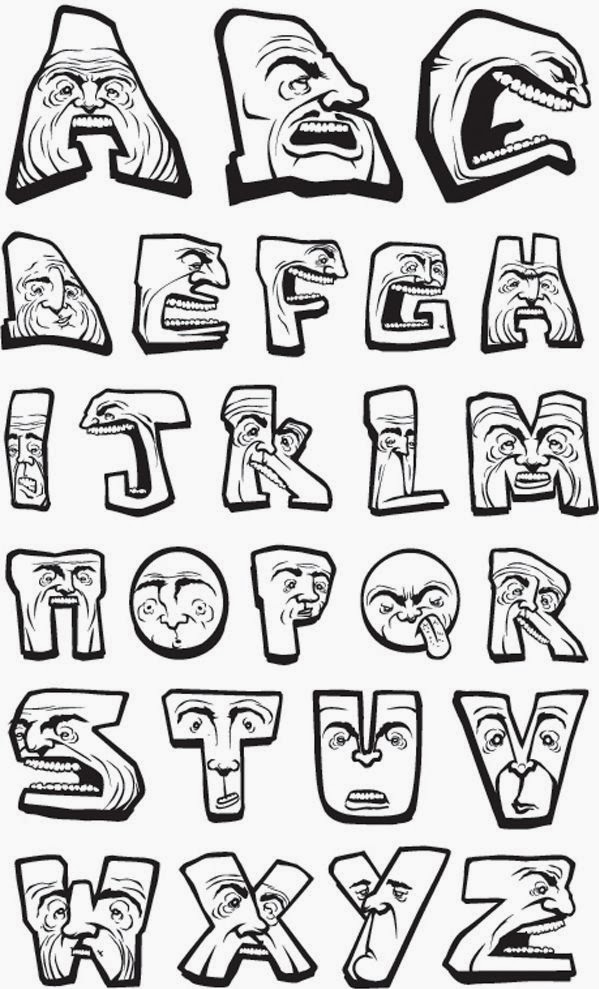Unlock Your Inner Artist: Mastering Cool Graffiti Letter Styles
Ever been captivated by the vibrant explosion of color and style that is graffiti art? Graffiti lettering, often the centerpiece of these urban canvases, holds a unique power to communicate and inspire. From intricate wildstyle masterpieces to bold and simple tags, the world of graffiti letter styles offers a diverse range of artistic expression.
This journey into the realm of cool graffiti lettering styles will explore the history, techniques, and artistic nuances that make this art form so compelling. We'll delve into the evolution of graffiti writing, examining how it transitioned from simple signatures to elaborate artistic statements. Whether you're an aspiring graffiti artist or simply appreciate the aesthetic power of this urban art form, this guide will equip you with the knowledge and inspiration to understand and appreciate the art of stylized graffiti lettering.
The roots of modern graffiti letter styles can be traced back to the late 1960s in Philadelphia and New York City. Initially used as a form of tagging, writers would use simple markers and spray paint to leave their mark on walls and subway cars. These early tags, often just stylized signatures or nicknames, were the precursors to the complex letter forms we see today. As the movement evolved, so did the lettering, incorporating influences from comic books, calligraphy, and even ancient scripts.
The importance of lettering in graffiti cannot be overstated. It's the foundation upon which the entire piece is built. A strong letter style can make or break a piece, communicating not only the writer's name but also their personality and artistic flair. Different graffiti letter styles, like bubble letters, wildstyle, and throwups, each carry their own unique aesthetic and level of complexity. Mastering these styles takes practice, patience, and a keen eye for design.
One of the main issues surrounding graffiti letter styles, and graffiti in general, is its legal status. While many consider it a vibrant art form, others view it as vandalism. This tension between art and illegality is an ongoing debate within the graffiti community and the wider public. Understanding the legal implications and respecting private property is crucial for anyone interested in exploring graffiti letter styles.
Bubble letters, a popular style, involve rounded, inflated letterforms, often overlapping for a playful effect. Wildstyle, on the other hand, is characterized by intricate, interwoven letters that are often difficult to decipher. Throwups, typically larger and quicker to execute, prioritize speed and boldness over intricate details. Practicing these various styles helps develop a versatile skillset and allows artists to experiment with different aesthetics.
Benefits of mastering cool graffiti letter styles include enhanced creativity, improved hand-eye coordination, and a deeper understanding of design principles. For example, practicing different letter styles can inspire new artistic ideas and push creative boundaries. The precise movements required for intricate lettering improve hand-eye coordination, a skill transferable to other artistic pursuits. Furthermore, understanding the balance, composition, and visual flow within graffiti lettering develops a strong foundation in design principles.
Advantages and Disadvantages of Graffiti Letter Styles
| Advantages | Disadvantages |
|---|---|
| Expressing creativity and individuality | Potential legal issues and fines |
| Developing artistic skills and hand-eye coordination | Negative perception by some as vandalism |
| Creating visually striking and impactful art | Difficulty in mastering complex styles |
Five best practices for creating impactful graffiti lettering include sketching your design beforehand, practicing basic letterforms, experimenting with different colors and fills, understanding perspective and 3D effects, and respecting existing artwork and property.
Frequently Asked Questions:
1. What are the most common graffiti letter styles? (Wildstyle, bubble letters, throwups, block letters)
2. What materials are needed for graffiti lettering? (Spray paint, markers, sketchbooks)
3. Where can I practice graffiti lettering legally? (Designated graffiti walls, personal canvases)
4. How do I develop my own unique graffiti letter style? (Experimentation, practice, studying other artists)
5. What are some tips for improving my lettering skills? (Focus on consistency, practice basic strokes, study calligraphy)
6. Is graffiti legal? (Depends on location and context; permission is crucial)
7. How can I learn more about graffiti history and culture? (Books, documentaries, online resources)
8. What are some famous graffiti artists? (Banksy, Futura 2000, Seen)
Tips and tricks for cool graffiti lettering include using drop shadows to add depth, incorporating arrows and connections for a dynamic flow, experimenting with different cap sizes for varied line widths, and layering colors for a vibrant effect. Remember to practice consistently and allow your style to evolve organically.
In conclusion, exploring cool graffiti letter styles is a journey into a vibrant and dynamic art form. From its humble beginnings as simple tags to the elaborate masterpieces we see today, graffiti lettering offers a unique platform for creative expression. By understanding its history, techniques, and the challenges it faces, we can gain a deeper appreciation for the artistry and skill involved. Whether you're an aspiring artist or simply an admirer, the world of graffiti lettering offers a wealth of inspiration and creative possibilities. So grab a sketchbook, some markers, and start exploring the exciting world of cool graffiti letter styles. Embrace the challenge, practice diligently, and let your creativity flow. The urban canvas awaits your unique mark.
Shacarri richardson race today will she rewrite history
Upgrade your drive finding the perfect toyota rav4 limited
The urban oasis bathtub ideas for small bathrooms












